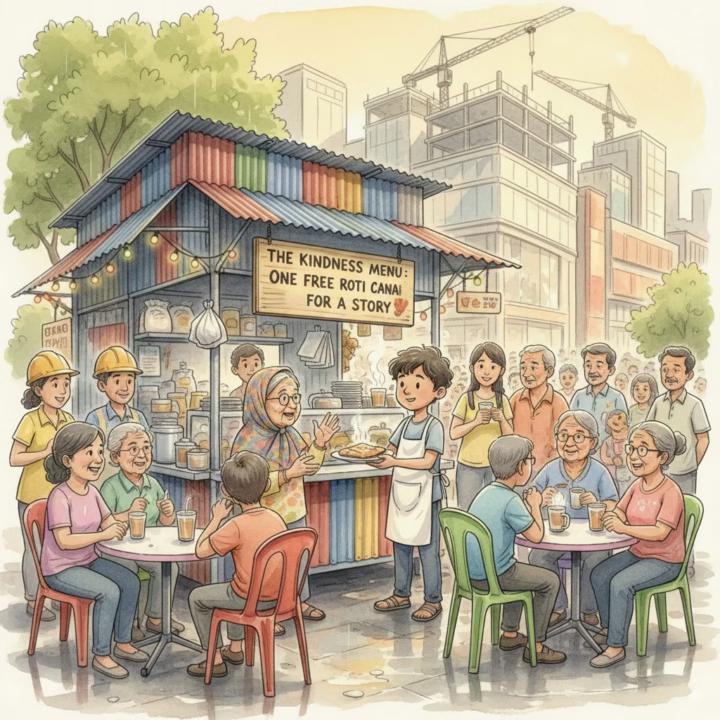
In the quiet corner of Jalan Sari, where the morning sun painted golden streaks across cracked pavement and the air always smelled of cumin and frying dough, stood Ahmad’s Mamak. It was small—just four plastic tables and a wobbly stool by the door—but to twelve-year-old Daniel Lim, it was the heart of the neighborhood.
His father, Mr. Ahmad, wasn’t his real name, of course. But everyone called him that because he was the mamak—the kind, round-faced man who flipped roti canai like magic, flinging it into the air with a snap of his wrist before it landed sizzling on the griddle. Daniel’s grandmother had started the stall thirty years ago after arriving from Kerala with nothing but a suitcase and a recipe. Now, it belonged to Daniel’s family—his mother, his younger sister Mei, and himself.
Daniel wasn’t loud like Mei, who sang Bollywood songs while sweeping the floor. He didn’t charm customers like his dad, who remembered everyone’s favorite tea order. Daniel was quiet. He liked to listen. He noticed things—the way Mr. Tan winced when he sat down (bad knee), how Aunty Lina always paid with exact change (tight budget), how the school janitor, Pak Mat, never ordered more than half a roti (saving money for his daughter’s schoolbooks).
So when the letter came—typed, crisp, and cold—saying that the land beneath Ahmad’s Mamak had been sold to Grand Horizon Mall, set to rise like a glass giant in six months, Daniel didn’t scream. He didn’t cry. He just folded the paper neatly and tucked it into his school bag.
But that night, as he watched his mother stare at the ceiling, her fingers twisting the edge of her apron, something stirred inside him.
What if we could make people remember us?
Not as just a stall. Not as “that place with good flatbread.” But as family.
The next morning, Daniel got up early. While his dad prepped the dough, Daniel took a piece of cardboard, a black marker, and a ruler. He measured carefully. Then he wrote in bold, uneven letters:
THE KINDNESS MENU
One free roti canai.
All you need to do is share a story.
Any story.
True. Silly. Sad. Happy.
Just speak from the heart.
He taped it to the front of the stall.
No one noticed it at first. But by noon, Mrs. Devi—the retired schoolteacher with the purple umbrella—paused as she passed.
“A story?” she asked, peering at the sign.
Daniel nodded, wiping his hands on his apron. “For a free roti. Any story.”
She smiled. “Well… once, I taught a boy who hated reading. Hid books under his desk like they were contraband. So I started reading aloud during lunch. One day, he brought his own book. Gave it to me at the end of the year. Thank you, it said on the first page. I still have it.”
Daniel handed her a warm, flaky roti canai, golden and buttery. “Here. That was a good story.”
She blinked, then patted his cheek. “You’re a good listener, Daniel.”
Word spread.
The next day, a construction worker in dusty boots sat down. “I’ll try. Once, back in my village, I climbed a mango tree so high, I saw the sea. Fell right into a net of laundry. Got scolded by seven aunties.”
Laughter bubbled from Daniel. Another roti, gone.
Then came Mei’s classmate, Farah, who whispered, “I’m scared of the dark. But I pretend my shadow is my twin sister. She keeps me company.”
Daniel didn’t laugh. He nodded. “That’s brave.”
And so it went.
The Kindness Menu became a ritual. People came not just for food, but to be heard. A widower shared how he still set a plate for his wife every dinner. A teenage boy admitted he cried when he failed his exam. A little girl told how she saved her lunch money to buy her brother a birthday pencil.
And each time, Daniel listened. Really listened.
Then one afternoon, a woman in a sleek black suit stepped up—Ms. Lin, the project manager for Grand Horizon Mall. She’d come to “assess community impact.”
She read the sign. Raised an eyebrow. “A story for a roti?”
Daniel nodded. “If you want one.”
She hesitated. “I… don’t usually do this.”
“That’s okay,” Daniel said. “No pressure.”
She sat. Sipped the teh tarik Daniel’s mom gave her—on the house. Then, softly, she said, “I grew up in a flat above a hawker center. My mother sold fish balls. I used to hate it—smelled like fish, noisy, crowded. I dreamed of tall buildings and quiet offices. Now I have both. But sometimes… I miss the sound of my mother calling my name over the sizzle of oil.”
Daniel didn’t say anything. He just handed her a roti.
She took a bite. Chewed slowly. Then smiled—a real one. “This… tastes like home.”
Weeks passed. The bulldozers didn’t come.
Then one morning, a new sign appeared—not a notice of demolition, but a banner.
Ahmad’s Mamak – Heritage Partner of Grand Horizon Mall
Opening Soon: Ground Floor, Community Corner
Daniel read it three times before running back to the stall.
His parents hugged each other. Mei danced in circles. His grandmother, sitting in her usual chair, wiped her eyes and said, “The heart remembers what the world tries to forget.”
The mall opened six months later—shiny, modern, full of lights. But on the ground floor, nestled between a phone store and a bubble tea shop, stood a small, familiar stall. Same wobbly stool. Same sizzling griddle. Same handwritten menu.
And beside it, proudly displayed, the original Kindness Menu.
People still came. Not just for roti, but to share.
And Daniel? He still didn’t talk much. But now, when someone paused at the sign, unsure, he’d smile and say, “Go on. I’m listening.”
Because stories, like roti canai, are best when shared.
And kindness?
Kindness doesn’t need a grand plan.
It just needs one bowl.
One heart.
One story at a time.
The End.
For every child who feels too quiet, too small, too unseen—remember: your voice matters. Even if it starts with just one story, one act, one roti canai at a time.










